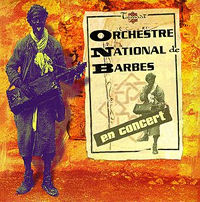| Columns Retired Columns & Blogs |
Recording of October 1998: Orchestre National de Barbès
ORCHESTRE NATIONAL DE BARBÈS: Orchestre National de Barbès
Larbi Dida, vocals; Youcef Boukella, vocals, bass; Aziz Sahmaqui, vocals, percussion; Fateh Benlala, vocals, mandolin; Fathilla Ghoggal, Olivier Louvel, guitar; Alain Debiossat, soprano sax; Toufik Mimouni, Jean Baptiste Ferr, keyboards; Ahmed Bensidhoune, bendir, darbouka; Kamel Tenfiche, vocals, percussion; Karim Ziad, karkabous; Michel Petry, drums
Tinder 42853192 (CD). 1998. Tajmaat, Djilali Aichioune, prods.; Luis Saldanha, Antoine Illouz, Delphine Presle, engs. AAD? TT: 78:33
Performance *****
Sonics ****
Larbi Dida, vocals; Youcef Boukella, vocals, bass; Aziz Sahmaqui, vocals, percussion; Fateh Benlala, vocals, mandolin; Fathilla Ghoggal, Olivier Louvel, guitar; Alain Debiossat, soprano sax; Toufik Mimouni, Jean Baptiste Ferr, keyboards; Ahmed Bensidhoune, bendir, darbouka; Kamel Tenfiche, vocals, percussion; Karim Ziad, karkabous; Michel Petry, drums
Tinder 42853192 (CD). 1998. Tajmaat, Djilali Aichioune, prods.; Luis Saldanha, Antoine Illouz, Delphine Presle, engs. AAD? TT: 78:33
Performance *****
Sonics ****
Already a sensation in Europe, the Orchestre National de Barbès' self-titled debut album has US world-music fans pricking up their ears to the unaccustomed beat of North Africa. In France, where the band is based, rai singer Khaled recently scored a number-one pop single, but in this country Arabic music is still a novelty, even to listeners familiar with salsa and Afro-pop. Critics here and abroad have lambasted the group for its pop-fusion impurity, but it's hard to quibble when your head starts to bob and your feet begin to twitch. This may not be the most profound example of Arabic music around, but it's surely the catchiest.
 In Barbès, a Parsian neighborhood heavily populated by immigrants from the Maghreb region of Northwest Africa, Algerian rai mingles with Moroccan chaabi and Gnawa music, Sufi devotional songs, sub-Saharan Afro-pop and all manner of Western sounds, from dancehall reggae to heavy metal. There bassist Youcef Boukella, woh'd formerly led a rock band in Algeria, met rai singer Larbi Dida, who shared his expansive vision of Arabic pop. The two soon found themselves at the center of a roving Pan-Arabic jam session that gradually coalesced into ONB's current 13-member lineup, which includes a number of non-Arab French musicians.
In Barbès, a Parsian neighborhood heavily populated by immigrants from the Maghreb region of Northwest Africa, Algerian rai mingles with Moroccan chaabi and Gnawa music, Sufi devotional songs, sub-Saharan Afro-pop and all manner of Western sounds, from dancehall reggae to heavy metal. There bassist Youcef Boukella, woh'd formerly led a rock band in Algeria, met rai singer Larbi Dida, who shared his expansive vision of Arabic pop. The two soon found themselves at the center of a roving Pan-Arabic jam session that gradually coalesced into ONB's current 13-member lineup, which includes a number of non-Arab French musicians.
The performances on Orchestre National de Barbès (originally released by Virgin France) are so tight and clean, you'd never guess the album was recorded live if not for the audience cheers between tracks. Electric guitars, bass, keyboards, and drum set provide a rock feel, while a soprano sax adds smooth-jazz colors. The synth washes grow cloying at times, but the keyboards also simulate Arabian wind instruments like the ghaita and ney, while guitars and mandolin mimic such stringed instruments as the oud and the rabab. Much of the band's ethnic flavor—as well as its driving, exotically syncopated pulse—is supplied by traditional percussion like the darbouka, the bendir, and the karkabous. But the main focus is on the ululant Arabic vocals, with several singers alternating lead parts or joining in unison.
Heavy hooks and varied grooves sustain interest over the album's nearly 80-minute length. Alain Debiossat, on soprano sax, snakes in like a Middle Eastern Kenny G. over what sounds like a West African balaphon to kick off the opening "Mimouna." "Hadga" chugs along in reggae riddim, and "Savon" rides a galloping funk beat. "Salam" dovetails a dancehall rap with a glorious refrain of "Salaam aleikum," while "Labou" floats on the chiming, twining guitar lines of Congolese soukous. Other tracks, such as "Sawye," "Zawiya," "Ma Ychali," and "Chalini," are more Arabic in character, each reflecting a different local Maghreb tradition, but all are spiced with rock, pop, and jazz ingredients, and all are irresistibly buoyant and tuneful.
The lyrics, translated in the liner notes, speak of love and spiritual brotherhood, avoiding the sex and alcohol themes that have turned rai singers into targets for fundamentalist assassins. There are references, however, to the vicious civil war that has devastated Algeria and stranded many emigrants in France; for example, "The cold wind of exile / disperses and scatters us... / Will we see again one day / a peaceful Algeria?" (from "Ma Ychali"). But even the most poignant lamentations are set to infectious party grooves, and the album's overall mood is one of joyous celebration. The Arabic world has long been separated from the West by a barrier of mutual incomprehension and distrust, but Orchestre National de Barbès' genre-bending intensity lifts the veil of Oriental mystery to reveal our common musical humanity. As a line from "Sawye" has it, "We are all alike / In front of the Almighty."—Larry Birnbaum
- Log in or register to post comments



































